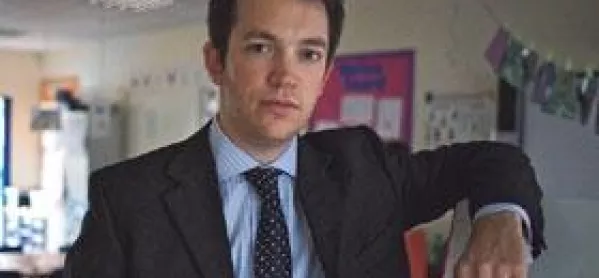A Teach First graduate has become headteacher of an academy after only three years in the classroom.
Max Haimendorf, 29, who has received just six weeks’ teacher training, will lead the King Solomon Academy in Marylebone, London, when it opens in September next year.
The small academy is run by the Ark education charity, which had been impressed by Mr Haimendorf’s work at Uxbridge High School, where he quickly rose from science teacher to head of year.
Mr Haimendorf, who attended St Paul’s public school in London and Oxford University, was one the first people enrol for Teach First in 2003. The programme selects high-flying graduates and places them in challenging inner city schools.
Mr Haimendorf taught at Uxbridge for three years before spending a year working for Teach First, then a year with a management consultancy.
He said that none of the prospective parents he met had commented on his age or experience.
“I think parents care more about what I’m saying than how old I am,” he said. “What matters is what I can deliver for pupils day to day - that should be all that matters.”
King Solomon will eventually be an all-through academy for 3- to 18-year- olds. Its primary wing is already open and has a separate head, Venessa Willms.
Mr Haimendorf’s official title is the academy’s secondary school headteacher. He will initially oversee just six key stage 3 teachers, and the school’s first Year 7 cohort of 60 pupils, but his responsibilities will expand as more students arrive. Even at full capacity, the academy will have only two forms per year.
This suits Mr Haimendorf, who co-authored an influential policy paper for Teach First last year warning that some urban secondary schools were too large, leading children to fall “under the radar” and teachers “fire- fighting” rather than teaching. Mr Haimendorf said that he did not regard small schools as a panacea, but hoped his school would prove their potential.
Christine Blower, the acting general secretary of the National Union of Teachers, said: “The key role of a headteacher is to lead the teaching and learning of the institution. This requires considerably more experience in the classroom than could be gained by doing Teach First”.
But Lesley Smith, a spokeswoman for Ark, said the charity had been impressed by Mr Haimendorf’s teaching and management experience. He would also have support from senior headteachers such as Sir Michael Wilshaw, an Ark adviser and head of Mossbourne Academy in Hackney.
“We’re not saying `Here’s the keys - off you go, you’re on your own’,” she said. “And, yes, Max knows that some of the teachers he recruits will have more experience.
“We were looking for someone very enthusiastic who could hit the ground running. And that’s Max.”
AN UNSTOPPABLE FORCE
The Teach First programme has turned into an unstoppable force on both sides of the Atlantic.
Teach for America, the US scheme on which it is based, is one of few education initiatives to gain whole-hearted backing from both presidential candidates, John McCain and Barack Obama.
Similarly, in the UK, it has been praised by Labour and Conservative MPs, with shadow education secretary Michael Gove promising to help it expand.
Brett Wigdortz, the American who founded Teach First in London, said that demand for the scheme far outstripped supply - more than 900 schools had requested to have one of its 200 graduates, who have all attended top- performing universities.
But he emphasised that Teach First would never replace normal teacher- training routes, such as PGCE courses, because it needed to preserve its elite quality. The maximum proportion who could be trained through the scheme would be 5 per cent, he said.
“The biggest recruiter of high quality graduates in the UK is PriceWaterhouseCoopers, which takes on 1,200 a year, but you need 16,000 new secondary teachers every year.”





